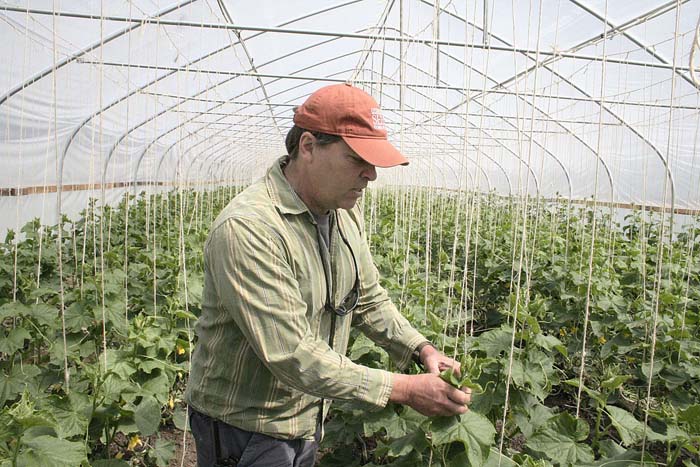Organics in Oregon
Published 10:46 am Wednesday, November 22, 2017

- Organic farmer Jamie Kitzrow checks on cucumbers growing in one of his greenhouses near Albany in this 2014 file photo.
With markets continuing to grow by double-digit percentages every year, Scott Lukas sees no end in sight to the rising demand for organic food.
“It is definitely growing significantly,” said Lukas, horticulturist for Oregon State University at the Hermiston Agricultural Research and Extension Center. “Just the general trend in organic produce is very quickly and steadily rising.”
While Lukas cannot explain what exactly is driving that momentum — a lot of it boils down to public perception, he said — the result is an opportunity for farmers to add organic production across the Columbia Basin and fetch premium prices for their crop.
For the first time, growers will have a chance to learn more about how to manage organic acres during the 44th annual Hermiston Farm Fair, with a series of presentations scheduled for 1-5 p.m. Thursday, Nov. 30. The session is one of several new additions to this year’s schedule, along with a pollinator workshop, vegetable session and precision irrigation seminar.
Lukas will moderate the organic session, featuring talks on how to manage fertilizer, cover crops and options for local markets. OSU will also conduct a needs assessment to gauge what kind of support growers would like to see from the university.
“I have heard growers expressing interest in organics,” Lukas said. “If there are good research-based techniques for them, they can do it in an economically viable way.”
According to the National Agricultural Statistics Service, Oregon had 461 organic farms in 2016 spanning 105,000 acres of cropland. Of that total 121 farms grew organic vegetables racking up $105 million in sales.
Oregon ranks fourth in the country in organic production, behind only California, Washington and Pennsylvania. Nationwide, organic crops earned a whopping $7.6 billion in sales, and Lukas said demand is growing around 10-12 percent per year.
Getting into organic farming, however, is no simple task. It requires extensive documentation to receive certification, and farmers may face a steep learning curve in adopting specific approved practices.
Rules and regulations for organic agriculture are adopted by the National Organic Program, while certification is done through the Oregon Department of Agriculture or groups such as Oregon Tilth. Things like conventional pesticides, synthetic fertilizer and antibiotics are not allowed on organic farms, and farmers need to show that they have not used any unapproved substances for at least three years before they can be certified.
“There’s a lot of farming skill that goes into it,” Lukas said. “That’s what we’re offering.”
The Columbia Basin is a great place for organic farming, Lukas said, because the wide open spaces and dry climate allows growers to control their environments much more easily than other areas. He said organic crops are on the rise locally, including at some of the region’s larger operations.
Threemile Canyon Farms in Morrow County has seen a bump in organic production from 7,500 acres to 8,800 acres this year, and general manager Marty Myers said they are planning for 12,000 next spring. That includes organic potatoes, carrots, onions, sweet corn, peas and blueberries.
“Our customer base is asking for it, and we’ve accommodated that,” Myers said.
The farm also grows organic feed crops to sell to organic dairy operations, including Threemile Canyon’s own Cold Springs Dairy near Hermiston.
Price premiums differ by commodity, but Myers said they generally range from 1.25 to 2 percent greater than conventional crops. But organic farming doesn’t come without its challenges. Myers said yields may be just 65-75 percent of conventional farms, and requires extensive labor to control weeds without chemicals.
“It’s not the answer to low commodity prices, let’s put it that way,” Myers said. “If you are committed, and you have the customer base to support it, you’ll probably do OK. If you are just chasing money, it’s probably not the right thing to do.”
For those eager to get into the business, Lukas said HAREC is dedicated to providing the best management practices for them to be successful.
“As production changes, HAREC will change with it to support the area,” Lukas said.
———
Contact George Plaven at gplaven@eastoregonian.com or 541-966-0825.





